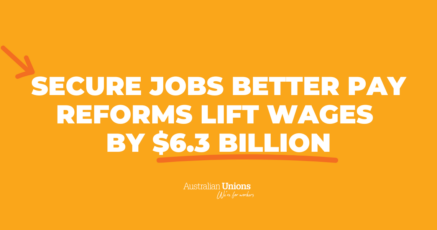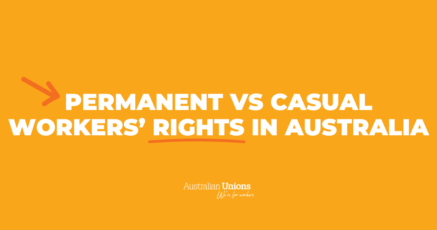Llwyd Saul estimates he’s applied for more than 150 permanent jobs.
“You don’t get calls back,”
Llwyd is an electrician based in Brisbane, with nearly three decades’ worth of experience. But he’s trapped on what he calls “the labour hire roundabout”.
“Most jobs only go from three to six months,” he tells ACTU President Michele O’Neil on her recent trip to Townsville, meeting with workers to gauge their fears of new industrial relations legislation.
“So when you do get a phone call back, they generally look at your resume and go ‘oh you jump around a fair bit, so you’re not really the person we’re looking for.’”
The rising tide of casualisation across Australia has cost workers like Llwyd the ability to find permanent work. Jobs that were once secure have all but dried up, replaced by the uncertainty that is labour hire.
“It basically means I just work for a recruitment company and they hire me out at a particular rate,” Llywd explains.
“And then I basically go work for that host employer as an electrician – as a casual – regardless of the length of the job,
“It’s not a real good existence, because they can just ask you to not come back tomorrow.”
The work comes and goes, with no real rhyme or reason. If Llwyd gets offered two months on his current job site, he’s got no choice but to be lured elsewhere by the promise of four.
All he wants is permanency, and the chance to show loyalty to an employer; to let his hard work speak for itself. But on the labour hire roundabout, he feels he has “no rights”.
“Half the time you don’t even meet the people. They just ring you up,”
“So I actually haven’t met them face-to-face and you’re just a name with a resume that you send through,
“I never have an off switch. So I’ve always got to be looking for work. You’re kinda… just stuck. So to speak. Like you’re just stuck in that rut all together.”
Llywd is an experienced tradesperson whose value has been swallowed up by labour hire. Unfortunately, it’s a story that is not unique, and that’s why Llwyd holds grave fears for a future backed by the Morrison Government’s new industrial relations bill.
“Giving the employers even greater ability to let go of workers… it just gives a lot of people no hope,” he says.
“I think if they give them that ability to chance the casual definition, then obviously that just gives the employer so much power it’s not funny,
“And, as it is, they’ve got way too much.”







SHARE:
Meet Llwyd: the labour hire roundabout